十个关于“快乐”的英文单词
心情类的英语单词
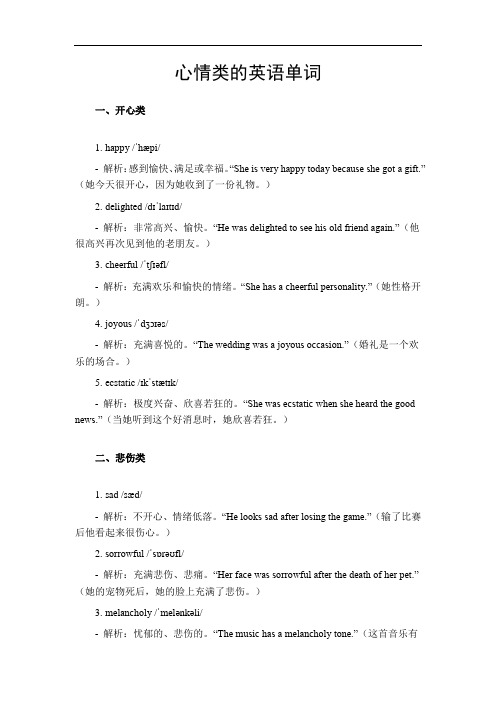
心情类的英语单词一、开心类1.happy /ˈhæpi/- 解析:感到愉快、满足或幸福。
“She is very happy today because she got a gift.”(她今天很开心,因为她收到了一份礼物。
)2.delighted /dɪˈlaɪtɪd/- 解析:非常高兴、愉快。
“He was delighted to see his old friend again.”(他很高兴再次见到他的老朋友。
)3.cheerful /ˈtʃɪəfl/- 解析:充满欢乐和愉快的情绪。
“She has a cheerful personality.”(她性格开朗。
)4.joyous /ˈdʒɔɪəs/- 解析:充满喜悦的。
“The wedding was a joyous occasion.”(婚礼是一个欢乐的场合。
)5.ecstatic /ɪkˈstætɪk/- 解析:极度兴奋、欣喜若狂的。
“She was ecstatic when she heard the good news.”(当她听到这个好消息时,她欣喜若狂。
)二、悲伤类1.sad /sæd/- 解析:不开心、情绪低落。
“He looks sad after losing the game.”(输了比赛后他看起来很伤心。
)2.sorrowful /ˈsɒrəʊfl/- 解析:充满悲伤、悲痛。
“Her face was sorrowful after the death of her pet.”(她的宠物死后,她的脸上充满了悲伤。
)3.melancholy /ˈmelənkəli/- 解析:忧郁的、悲伤的。
“The music has a melancholy tone.”(这首音乐有一种忧郁的基调。
)4.heartbroken /ˈhɑːtbrəʊkən/- 解析:极度伤心、心碎的。
“She was heartbroken when her boyfriend left her.”(当她的男朋友离开她时,她心碎了。
关于pleasure的用法及解释

千里之行,始于足下。
关于pleasure的用法及解释Pleasure是一个英文单词,它在不同的上下文中可以有不同的用法和解释。
以下是关于pleasure的常见用法及解释:1. 名词用法:- 愉悦、快乐:Pleasure可以指一种感觉或情绪,表示愉悦和快乐。
例如:I take great pleasure in playing the piano.(我弹钢琴非常享受) - 乐趣、喜好:Pleasure也可以表示某种活动或事物带来的乐趣或喜好。
例如:Reading is one of my greatest pleasures.(阅读是我最大的乐趣之一)2. 动词用法:- 使愉悦、满足:作为动词,pleasure可以表示使某人感到愉悦和满足。
例如:The vacation pleasured us immensely.(度假使我们非常愉快) - 愿意、乐意:Pleasure还可以表示愿意或乐意做某事。
例如:I would be pleased to help you.(我乐意帮助你)3. 常见短语:- With pleasure:表示愿意或乐意做某事。
例如:Can you help me with this? - With pleasure!(你能帮我这个忙吗?-当然愿意!) - It's my pleasure:表示帮助别人或做某事的乐趣和荣幸。
例如:Thank you for the help. - It's my pleasure.(谢谢你帮忙。
-不客气,很荣幸可以帮上忙。
)4. 相关词语:第1页/共2页锲而不舍,金石可镂。
- Pleasurable:形容词形式,表示令人愉悦的、有乐趣的。
例如:The book offers a pleasurable reading experience.(这本书提供了一种愉快的阅读体验)- Enjoyment:名词,表示享受和快乐的感觉。
例如:She derives great enjoyment from painting.(她通过绘画得到了极大的乐趣)5. 习语及特定用法:- Pleasure-seeking:寻求快乐的,追求享乐的。
100个漂亮的英文单词
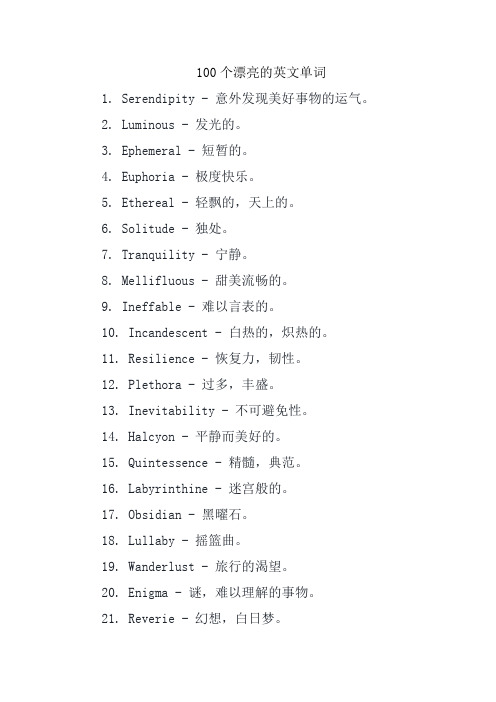
100个漂亮的英文单词1. Serendipity - 意外发现美好事物的运气。
2. Luminous - 发光的。
3. Ephemeral - 短暂的。
4. Euphoria - 极度快乐。
5. Ethereal - 轻飘的,天上的。
6. Solitude - 独处。
7. Tranquility - 宁静。
8. Mellifluous - 甜美流畅的。
9. Ineffable - 难以言表的。
10. Incandescent - 白热的,炽热的。
11. Resilience - 恢复力,韧性。
12. Plethora - 过多,丰盛。
13. Inevitability - 不可避免性。
14. Halcyon - 平静而美好的。
15. Quintessence - 精髓,典范。
16. Labyrinthine - 迷宫般的。
17. Obsidian - 黑曜石。
18. Lullaby - 摇篮曲。
19. Wanderlust - 旅行的渴望。
20. Enigma - 谜,难以理解的事物。
21. Reverie - 幻想,白日梦。
22. Aurora - 极光,晨曦。
23. Jubilant - 欢欣鼓舞的。
24. Synthesis - 综合,合成。
25. Harmony - 和谐。
26. Epiphany - 顿悟,启示。
27. Elysium - 极乐世界。
28. Nostalgia - 怀旧。
29. Aesthetic - 美学的。
30. Vivid - 生动的,鲜明的。
31. Resplendent - 光辉灿烂的。
32. Ubiquitous - 无处不在的。
33. Zenith - 顶点,巅峰。
34. Eloquent - 雄辩的,有说服力的。
35. Seraphic - 天使般的。
36. Panacea - 万能药。
37. Empathy - 同理心。
38. Chiaroscuro - 明暗对比。
不同的表达快乐的英文单词――how to express happiness
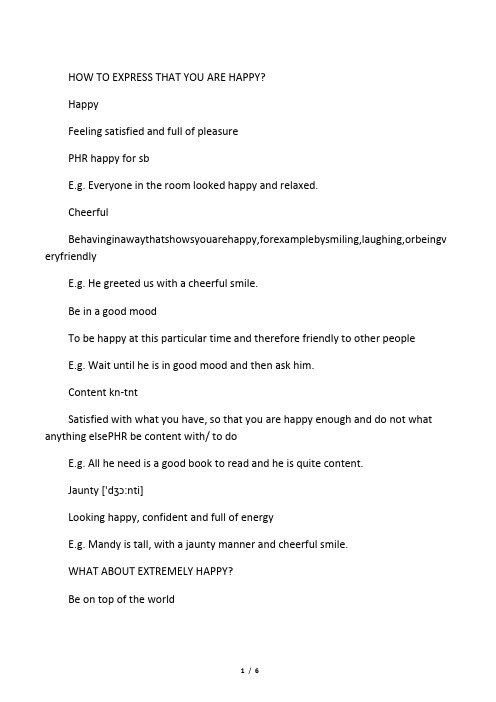
HOW TO EXPRESS THAT YOU ARE HAPPY?HappyFeeling satisfied and full of pleasurePHR happy for sbE.g. Everyone in the room looked happy and relaxed.CheerfulBehavinginawaythatshowsyouarehappy,forexamplebysmiling,laughing,orbeingv eryfriendlyE.g. He greeted us with a cheerful smile.Be in a good moodTo be happy at this particular time and therefore friendly to other peopleE.g. Wait until he is in good mood and then ask him.Content kn-tntSatisfied with what you have, so that you are happy enough and do not what anything elsePHR be content with/ to doE.g. All he need is a good book to read and he is quite content.Jaunty ['dʒɔ:nti]Looking happy, confident and full of energyE.g. Mandy is tall, with a jaunty manner and cheerful smile.WHAT ABOUT EXTREMELY HAPPY?Be on top of the worldTofeelextremelyhappyandconfidentbecauseyouareverysuccessfulorbecausesom ethingvery good has happened to youE.g. Everything is going well for him now and he is on top of the world.Blissfully ['blisful](spiritual happiness, ecstasy of salvation) happyExtremely happy, for example, because you are in love or something very good has happened toyouE.g. She would lie on the beach for hours, blissfully happy.RadiantRadiant smile/ face etc.(=looking extremely happy) N. RadianceEcstatic[ik'stætik](rapture['ræptʃə])Extremely happy and excited about somethingadv. ecstaticallyE.g. When the show finished the audience was ecstaticJoyfulAwordusedespeciallyinliterature:agroupofpeoplethatarejoyfulareextremelyhapp y,especially when they are celebrating a happy eventE.g. The mood in the party was joyful.The second daypleasing[ˈpli:ziŋ]a.使人愉快的;合意的intransitive verb1 : to afford or give pleasure or satisfaction2 : like, wish3 archaic : to have the kindnesstransitive verb1 : to give pleasure to2 : to be the will or pleasure ofThis painting has a pleasing balance of shapes and colours.这幅画在构图和色彩方面都十分谐调。
英文常见单词
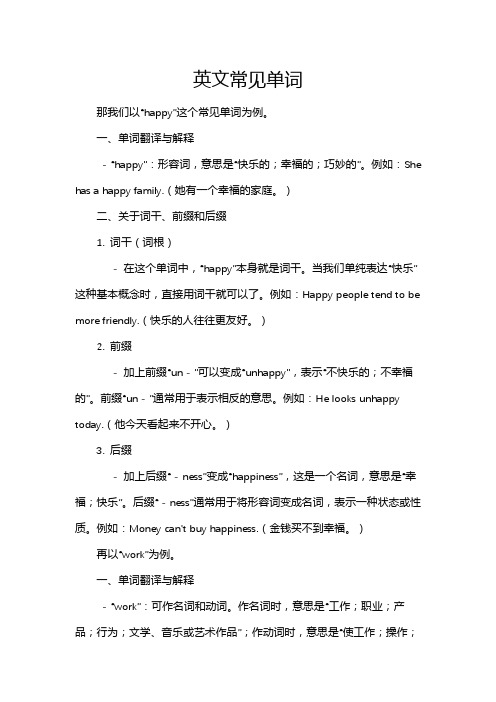
英文常见单词那我们以“happy”这个常见单词为例。
一、单词翻译与解释- “happy”:形容词,意思是“快乐的;幸福的;巧妙的”。
例如:She has a happy family.(她有一个幸福的家庭。
)二、关于词干、前缀和后缀1. 词干(词根)- 在这个单词中,“happy”本身就是词干。
当我们单纯表达“快乐”这种基本概念时,直接用词干就可以了。
例如:Happy people tend to be more friendly.(快乐的人往往更友好。
)2. 前缀- 加上前缀“un - ”可以变成“unhappy”,表示“不快乐的;不幸福的”。
前缀“un - ”通常用于表示相反的意思。
例如:He looks unhappy today.(他今天看起来不开心。
)3. 后缀- 加上后缀“ - ness”变成“happiness”,这是一个名词,意思是“幸福;快乐”。
后缀“ - ness”通常用于将形容词变成名词,表示一种状态或性质。
例如:Money can't buy happiness.(金钱买不到幸福。
)再以“work”为例。
一、单词翻译与解释- “work”:可作名词和动词。
作名词时,意思是“工作;职业;产品;行为;文学、音乐或艺术作品”;作动词时,意思是“使工作;操作;经营;使缓慢前进”。
例如:I have a lot of work to do.(我有很多工作要做。
作名词)He works in a factory.(他在一家工厂工作。
作动词)二、关于词干、前缀和后缀1. 词干(词根)- “work”本身就是词干。
在表达基本的“工作”或“操作”概念时直接使用。
例如:This machine doesn't work.(这台机器不工作了。
)2. 前缀- 加上前缀“re - ”变成“rework”,表示“重做;修订”。
前缀“re - ”常表示“再次;重新”的意思。
例如:We need to rework this plan.(我们需要重新制定这个计划。
表示开心的英文单词

表示开心的英文单词介绍开心是一种积极的情绪状态,它给人带来欢快和满足的感觉。
在生活中,我们常常会遇到让我们感到开心的事情,比如取得好成绩、赢得比赛、得到他人的赞赏等。
当我们体会到开心时,我们可以用英文单词来表达我们的开心之情。
本文将详细介绍一些表示开心的英文单词,帮助我们更好地表达自己的开心。
快乐的英文单词1. Happy“Happy”是表示开心的常用词汇,它可以用来形容一种兴奋愉悦的心情。
例如:- I feel happy today because I got a promotion at work. - The children were very happy when they received their Christmas presents.2. Joyful“Joyful”是一个表示极度开心的词汇,它通常用于描述非常高兴和兴奋的情绪。
例如: - The students were joyful when they found out they were going on a field trip. - The joyful laughter of the children filled the air at the birthday party.3. Delighted“Delighted”表示非常高兴、感到开心和满足的情绪。
例如: - I was delighted to see my best friend after a long time apart. - The audience was delighted by the amazing performance.4. Ecstatic“Ecstatic”用来形容一种非常极度的开心和激动的情绪。
例如: - She was ecstatic when she won the lottery and became a millionaire. - The team’s victory brought the fans to an ecstatic celebration.5. Thrilled“Thrilled”表示非常兴奋、激动和开心。
快乐愉悦的英文单词

快乐愉悦的英文单词Cheerful: A State of Infectious Happiness.Cheerfulness, an ebullient state of mind, is a quality that radiates warmth and positivity, illuminating the world with its infectious glow. It is a disposition characterized by a buoyant spirit, an optimistic outlook, and a contagious joy that spreads like wildfire, igniting laughter and smiles wherever it goes.The cheerful individual exudes an aura of happinessthat effortlessly uplifts those around them. Their sunny disposition is like a beacon of light, casting its golden rays upon all who cross their path. They possess an uncanny ability to brighten even the darkest of days, transforming frowns into grins and dispelling gloom with their unwavering optimism.Characteristics of a Cheerful Person:A positive outlook: Cheerful people approach life with an unwavering belief in the power of positivity. They see the silver lining in every cloud, focusing on the opportunities rather than the obstacles.A resilient spirit: Life's challenges are inevitable, but cheerful individuals possess an indomitable spirit that allows them to bounce back from adversity with grace and resilience.A sense of gratitude: Cheerful people have a deep appreciation for the simple joys of life. They find contentment in the present moment and express gratitude for the blessings they possess.A playful nature: Cheerful people often have a childlike sense of wonder and playfulness. They embrace laughter, humor, and creativity, finding joy in the everyday moments.A compassionate heart: Cheerful people are empathetic and compassionate, extending kindness and support to thosearound them. They believe in the power of human connection and strive to make the world a more loving and joyful place.The Benefits of Cheerfulness:Maintaining a cheerful disposition not only uplifts others but also brings numerous benefits to the individual. Cheerfulness has been linked to:Improved physical health: Studies have shown that cheerful people have stronger immune systems, lower blood pressure, and reduced risk of chronic diseases.Enhanced mental well-being: Cheerfulness promotes positive mental health, reducing stress, anxiety, and depression. It fosters a sense of purpose and meaning, contributing to overall psychological well-being.Increased social connections: Cheerful individuals attract others like moths to a flame. Their positive energy and infectious joy create a welcoming atmosphere, making them sought-after companions.Improved productivity: Cheerful people tend to be more productive and engaged in their work. They approach tasks with enthusiasm and optimism, finding joy in the process.Enhanced creativity: Cheerfulness stimulates the imagination and encourages creative thinking. It provides a fertile ground for new ideas and innovative solutions.Cultivating Cheerfulness:Cheerfulness is not something that one can simplyswitch on or off. It is a state of mind that requires cultivation and practice. Here are some tips for fostering cheerfulness in your life:Practice gratitude: Take time each day to reflect on the things you are grateful for, both big and small. Gratitude shifts your focus to the positive aspects of life, promoting cheerfulness.Spend time with positive people: Surround yourselfwith individuals who radiate positivity and joy. Their upbeat attitudes will rub off on you, lifting your spirits and boosting your cheerfulness.Engage in activities that bring you joy: Identify the activities that make you truly happy and make them a regular part of your life. Whether it's painting, dancing, or spending time in nature, these activities will nourish your cheerfulness.Be kind to yourself: Treat yourself with the same compassion and understanding you would extend to a friend. Self-compassion fosters a positive self-image and contributes to overall cheerfulness.Seek professional help if needed: If you struggle to maintain a cheerful disposition, don't hesitate to seek professional help from a therapist or counselor. They can provide support, guidance, and coping mechanisms to help you cultivate cheerfulness.In this fast-paced, often chaotic world, cheerfulnessis a precious commodity. It is a beacon of hope that illuminates the path forward, reminding us of the beauty and joy that life has to offer. By cultivating cheerfulness within ourselves and sharing it with others, we create a ripple effect that has the power to transform the worldinto a more positive, joyful place.。
六一儿童节快乐的英文单词
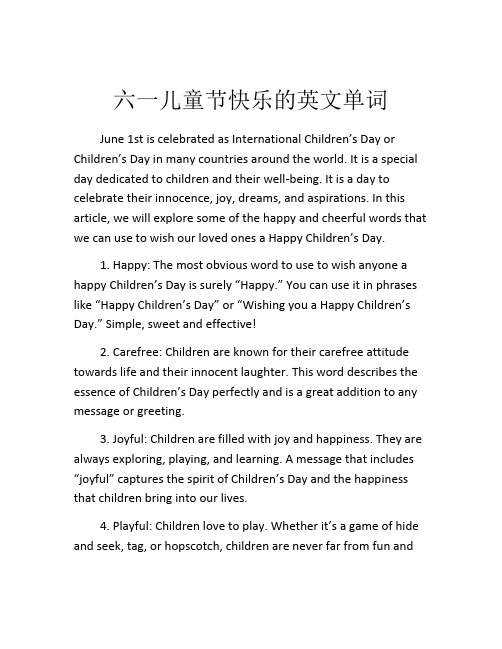
六一儿童节快乐的英文单词June 1st is celebrated as International Children’s Day or Children’s Day in many countries around the world. It is a special day dedicated to children and their well-being. It is a day to celebrate their innocence, joy, dreams, and aspirations. In this article, we will explore some of the happy and cheerful words that we can use to wish our loved ones a Happy Children’s Day.1. Happy: The most obvious word to use to wish anyone a happy Children’s Day is surely “Happy.” You can use it in phrases like “Happy Children’s Day” or “Wishing you a Happy Children’s Day.” Simple, sweet and effective!2. Carefree: Children are known for their carefree attitude towards life and their innocent laughter. This word describes the essence of Children’s Day perfectly and is a great addition to any message or greeting.3. Joyful: Children are filled with joy and happiness. They are always exploring, playing, and learning. A message that includes “joyful” captures the spirit of Children’s Day and the happ iness that children bring into our lives.4. Playful: Children love to play. Whether it’s a game of hide and seek, tag, or hopscotch, children are never far from fun andgames. “Playful” is a great word to use to add a touch of fun and adventure to your message.5. Kind: Children are known for their kind and caring nature. They are always ready to lend a helping hand to anyone in need. A message that includes “kind” acknowledges the importance of kindness and compassion in today’s world.6. Creative: Children have a boundless imagination and are incredibly creative. They can paint, draw, sing, dance, and create anything they put their minds to. Including “creative” in your message reinforces the importance of nurturing children’s creativity and allowing them to explore their talents.7. Curious: Children are curious beings. They are always asking questions, exploring, and discovering new things. A message that includes “curious” acknowledges the importance of curiosity and encourages children to keep asking questions and learning.8. Energetic: Children are full of energy and enthusiasm, and they radiate positivity and vitality. The word “energetic” is a great way to convey this youthful vitality and exuberance.9. Innocent: Children are innocent and pure-hearted. Their innocence is one of their most endearing qualities, and it is something that we can all learn from. Including “innocent” in your message celebrates the beauty of innocence and reminds us of the purity of childhood.10. Dreamers: Children are dreamers. They have big imaginations and are not afraid to dream big. Including “dreamers” in your message encourages children to believe in themselves and their dreams.ConclusionChildren’s Day is a special occasion, and using happy and cheerful words in your messages can help make it even more special. Whether you use one word or several, the most important thing is to communicate your love and affection for the children in your life. So go ahead, wish them a happy Children’s Day, and let them know how much they mean to you!。
- 1、下载文档前请自行甄别文档内容的完整性,平台不提供额外的编辑、内容补充、找答案等附加服务。
- 2、"仅部分预览"的文档,不可在线预览部分如存在完整性等问题,可反馈申请退款(可完整预览的文档不适用该条件!)。
- 3、如文档侵犯您的权益,请联系客服反馈,我们会尽快为您处理(人工客服工作时间:9:00-18:30)。
十个关于“快乐”的英文单词
- 1 -
Defined as pleasure derived from attaining what you consider to be good, the term happiness comes from the Old Norse root happ, which literally means “chance” or “good luck.” The noun happiness entered English in the 16th century, though the adjective happy predates this noun by 200 years. Happiness的定义是,因获得你心目中美好的事物,油然而生的一种快乐。
这个词来源于古斯堪的纳维亚语的词根happ,本意为“机会”、“好运”。
名词happiness进入英语是在16世纪,其形容词happy比名词早了200年进入英语。
- 2 -
Mirth is jollity, especially when accompanied by laughter. From Germanic origin, mirth shares a root with the word merry. It's been around since the time Old English was spoken.
Mirth就是欢乐(jollity),尤其还伴随着笑声。
来源于德语,与merry同属一个词根。
古英语时代已经出现这个词。
- 3 -
Joy is the emotion of great delight caused by something exceptionally good or satisfying. This termed entered English way back in the 1200s from the Old French joie.
Joy是因意外的惊喜而满足带来的极大快乐。
这个词来自古法语joie,13世纪进入英语。
- 4 -
Bliss is supreme happiness, often associated with the joy of heaven. It comes from the Old English blis and is related to the terms bless and blithe.
Bliss是极致的幸福,通常用来形容天堂的乐福。
来源与古英语blis,与bless (祝福)和blithe(无忧无虑的)都有联系。
- 5 -
Elation is a feeling of great joy or pride, or of exultant gladness. In Middle English elat means “proud.” Elation ultimately comes from Latin, by way of Old French.
Elation是极大的欢欣和自豪,或狂喜。
在中古英语中,elat意即骄傲。
Elation 最早来源于拉丁语,通过法语传入英语。
- 6 -
Glee is open delight or pleasure. This term has had musical associations since around 1000 when the noun glee could be used to refer to entertainment of the harmonious variety. The meaning of delight came about 100 years later. By the 17th century, glee was considered obsolete or comic by various dictionary editors, only to reemerge in common usage in the late 18th century.
Glee是喜形于色的快乐。
这个词从1000年左右开始产生音乐上的联系,当时名词glee会被用来形容各种音乐合唱的娱乐活动。
其关于“快乐”的这一层意思在100年之后才产生。
到了17世纪,各类字典编纂者都认为glee已经古老而过时,或诙谐滑稽。
18世纪末,这个词才重新被大众使用。
- 7 -
Exultation is lively or triumphant joy, generally over success or victory. It comes from the Latin exultationem and has been used in English since the 1400s.
Exultation是欢腾而胜利的快乐,原因通常是成功或获胜。
来源于拉丁语exultationem ,15世纪开始,在英语中使用。
- 8 -
Euphoria is a state of intense happiness and self-confidence. The term is sometimes used in pathology to describe the state of patients. This term has existed in English since the late 1600s and comes from the Greek euphoria meaning “a state of well-being.”
Euphoria是强烈的快乐和自信的状态,有时用在病理学中,形容病人的一种状态(欣快症)。
这个词从17世纪末开始在英语中使用,来源于希腊语euphoria,意为“康乐的状态。
”
- 9 -
Jubilation is a feeling or loud expression of joy, or a festive celebration. This term entered English in the late 1300s from the Latin meaning “shouting for joy.” It has since been immortalized in Simon and Garfunkel's song “Cecilia”: “Jubilation! She loves me again; I fall on the floor and I’m laughing.” Jubilation是快乐的感觉,或喜悦的欢呼,或庆祝活动。
这个词于14世纪末进入英语,来源于拉丁语,意为“欢乐地大喊”。
这个词因为民谣摇滚双人组合“西蒙和嘎芬寇尔”的那首《Cecilia》而成为不朽,里面的歌词唱道:“Jubilation! She loves me again; I fall on the floor and I’m laughing.”
- 10 -
Rapture is ecstatic delight or joyful ecstasy. It comes from the Latin raptura meaning “abduction,” “carrying away” and “rape.” In Middle French rapture means "abduction." This term can also refer to the carrying of a person to another sphere of existence. In Christian theology, the Rapture will happen when Christ returns to earth.
Rapture是醉心的喜悦和快乐的陶醉。
来源于拉丁语raptura,意为“诱拐”“使着迷”“强暴”。
中古法语中rapture即“绑架”。
这个词还可以指将一个人引入另一种存在空间中。
在基督教神学中,耶稣基督回到人世时,Rapture就会发生。
